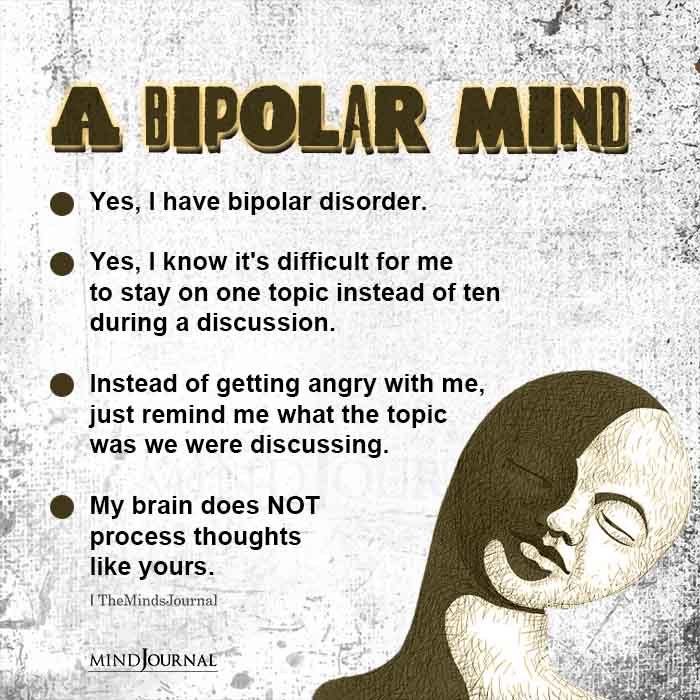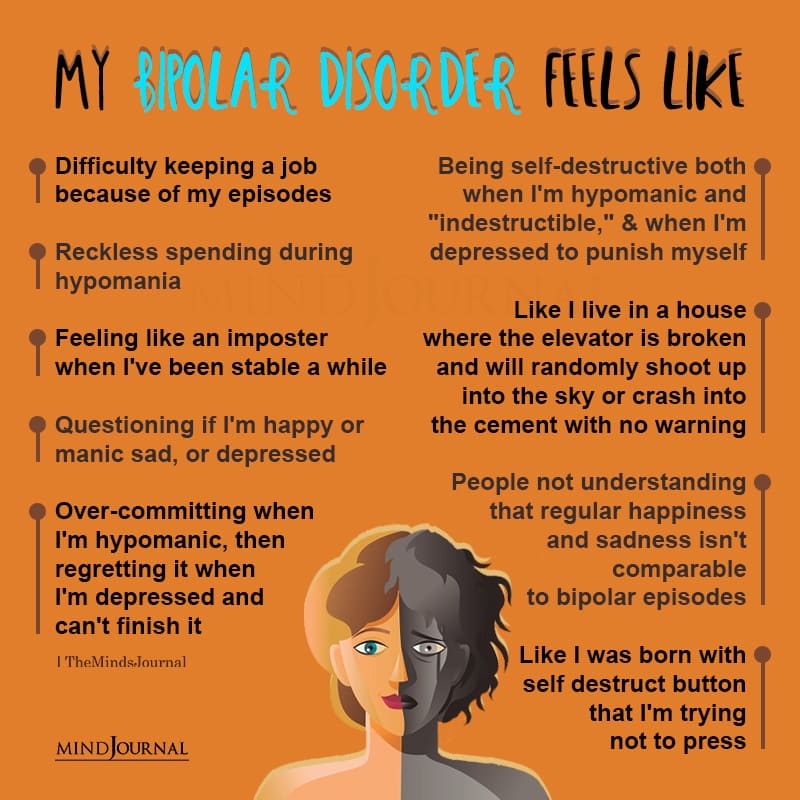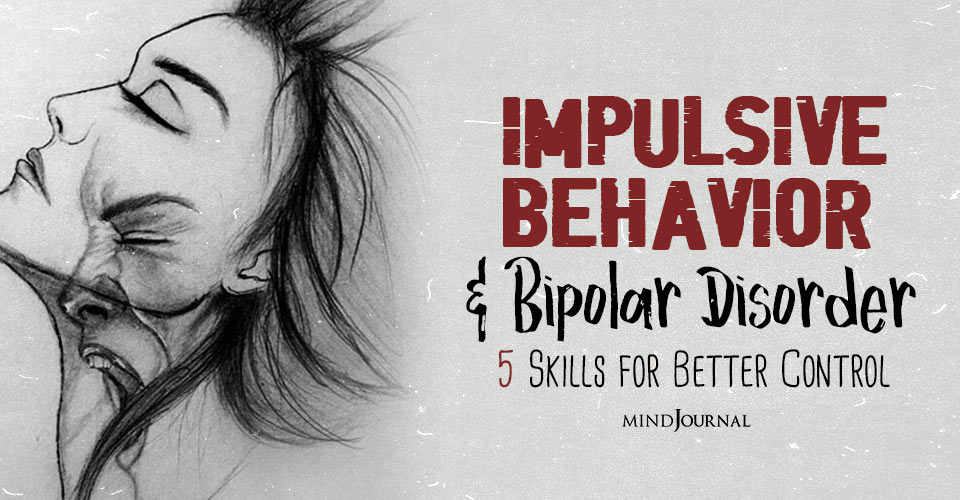Controlling impulsive behavior during hypomania or impulsive behavior in bipolar disorder might be one of the most difficult challenges to overcome. However, these 5 tips for controlling impulsive behavior can prove to be really helpful. Let’s find out more about impulsive behavior and bipolar disorder, and how to work towards control during hypomania.
Key Points:
- Some people engage in more impulsive behaviors when they are experiencing symptoms of hypomania.
- The 48-Hour Rule can help people create space between the urge to act and the action itself.
- Other helpful skills include stepping away from the situation when needed and checking in on your thoughts.
Some people notice that they engage in more impulsive behaviors when they are experiencing symptoms of hypomania.
We can define impulsive behaviors as actions that might feel good or desirable in the moment but that, in the long term, may have more negative consequences for you. Examples of these types of behaviors include spending sprees, excessive substance use, and risky sexual activities.
Some people also find that when they are experiencing hypomania they also feel more irritable, which can make it harder to resist the impulse to get involved in confrontations with others that could have undesired lasting consequences (i.e., getting into a confrontation at work).
Here are some skills that may help you resist acting on impulse during periods of hypomania.
Related: Bipolar Disorder: 10 Facts You Should Know About It
Impulsivity And Bipolar Disorder: 5 Skills That Can Help
1. The 48-Hour Rule.
The 48-Hour Rule suggests you wait a minimum of two full days and have two full nights of sleep before making any major decision when you are experiencing hypomania (Newman et al., 2002).
Decisions could relate to anything at all, including significant purchases (new car) or major life changes (quitting your job). The spirit of the 48-Hour Rule is to create space (i.e., two days) between the urge to act and the action itself, ensuring that you are only making and acting on decisions after getting enough sleep.
Many people with bipolar disorder experience sleep difficulties, and sleeping fewer hours than normal is a common symptom of hypomania. Research suggests that several consecutive days of decreased sleep can lead to riskier decision-making.
By ensuring that you are getting enough sleep before making any major decisions, it is more likely that you will be able to consider the risks associated with a particular course of action. It can be helpful to use this rule alongside the Two-Person Feedback Rule, described below.

2. The Two-Person Feedback Rule.
The Two-Person Feedback Rule suggests you check with two trusted people (among friends, family members, or loved ones) before making any big decision when you are experiencing hypomania (Newman et al., 2002; Otto et al., 2008).
Similar to the goal of the 48-Hour Rule, the goal of the Two-Person Feedback Rule is to ensure that you are considering and weighing the long-term risks associated with a given decision before acting on it.
Sometimes, during hypomania, people may believe that their decision-making and thinking are better than the decision-making of others. Incorporating trusted individuals in the decision-making process who can offer unique perspectives may make it easier to arrive at a balanced decision.
Related: Everything You Need To Know About Bipolar Disorder
3. Step away from the situation—literally.
If you are in a situation where there is a temptation to act on an impulsive behavior or if you think it is likely that the situation could lead to some type of confrontation, try to leave the situation if you can. It can be hard to resist acting on an impulse when the environment is not favorable to long-term thinking.
This skill is also relevant before you find yourself in such situations. If you have reason to think that a specific situation could trigger impulsive behavior, think about the value of avoiding the situation entirely.
Remember that, during hypomania, people may experience increased irritability and it can make a confrontation more likely. Consider holding off on having any challenging conversations with others until your irritability and hypomania have decreased.

4. Check in on your thoughts.
Hypomania can cause people to have hyper-positive thinking. This way of thinking leads people to overlook or minimize the risks of their behaviors and to overestimate positive outcomes that could result from their behaviors.
Hyperpositive thinking can drive impulsive behaviors. Here are some examples: spending your year’s savings on replacing your wardrobe without thinking about the possible financial consequences of this decision (“I’m sure I’ll get a raise in the future, so my savings will be replaced at some point”) and driving too fast without thinking about the potential speeding ticket you could receive (“I really want to drive fast right now, and that’s all I’m focused on”).
Check in with yourself to catch hyper-positive thinking during episodes of hypomania. If you have the urge to engage in impulsive behavior, take a step back before engaging in that behavior and take stock of your thoughts. Ask yourself: “What are some of the risks that I might be overlooking with this thought?”
During acute manic episodes (as opposed to hypomanic episodes), this strategy is not advised as it is challenging for people in manic episodes to check in on their thoughts in this way. For people experiencing manic episodes, other strategies on this list (such as #1, #2, and #5) might be more appropriate.
Related: What Is Manic Depression? Types, Symptoms, and Treatment
5. Limit access to items that could make it easier to act on impulse.
Think back on past episodes of hypomania and consider whether there were any items or factors that made it easier to act on impulse (i.e., access to substances, access to credit cards). It can be helpful to restrict your access to such items during periods of hypomania.
When you are experiencing hypomania, it can be helpful to ask a trusted person to hold onto your credit cards to limit the risk of any uncontrolled spending.
For people with bipolar disorder, it is important to limit the use of alcohol more generally. During hypomanic states, avoid using alcohol or any other substances.
Alcohol, for instance, can decrease your inhibitions and make it even harder to resist the urge to act on impulse or to engage in balanced decision-making.
Want to know more about examples of hypomania episodes? Check this video out below!
References:
Gold, A.K. & Sylvia, L.G. (2016). The role of sleep in bipolar disorder. Nature and science of sleep, 8, 207-214. Maric, A., Montvai, E., Werth, E., Storz, M., Leemann, J., Weissengruber, S., Ruff, C. C., Huber, R., Poryazova, R., & Baumann, C. R. (2017). Insufficient sleep: Enhanced risk-seeking relates to low local sleep intensity. Annals of neurology, 82(3), 409–418. Newman C.F., Leahy R.L., Beck A.T., Reilly-Harrington, N.A., & Gyulai L. (2002). Bipolar disorder: A cognitive therapy approach. American Psychological Association. Otto, M., Reilly-Harrington, N. Kogan, J.N. Henin, A., Knauz, R.O., & Sachs, G.S. (2008). Managing bipolar disorder: a cognitive behavior treatment program. Oxford University Press.
Written By Alexandra Gold Originally Appeared On Psychology Today










Leave a Reply